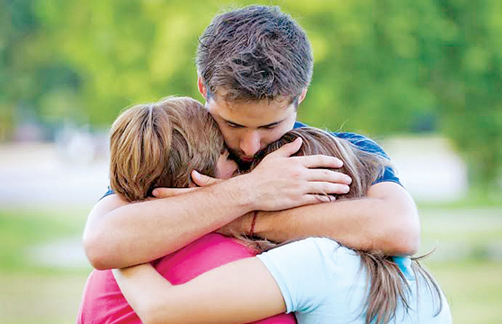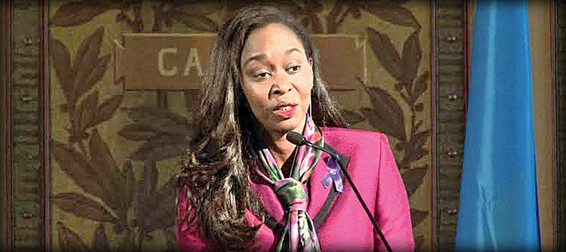|
Forgiveness:
The hallmark of the strong and the brave
by Lionel Wijesiri
Immaculee Ilibagiza is a survivor of the Rwandan genocide that took
place in the mid-nineties. Political tensions between the Hutu and Tutsi
tribes resulted in the massacre of hundreds of thousands of members of
the Tutsi tribe and of members of the Hutu tribe who opposed the
genocide. On Easter Sunday 1994, when Ilibagiza and her family were
gathered together, Ilibagiza's older brother, Damascene, begged their
father to take the family and flee to safety.
|

Forgivesness starts from the heart of the hurt |
They made the fateful decision to stay. On April 6, 1994, a plane
carrying the Rwandan president, a Hutu, was shot down, and everyone on
board was killed. Soon after, a killing spree began that targeted the
Tutsi people. Ilibagiza and her younger brother, Vianney, managed to
make their way to a local Hutu pastor's home, who provided protection
from the chaos that was surrounding them.
When they arrived, they learned the heart-breaking news that Vianney
could not stay. Ilibagiza and seven other women hid in a small (1 square
meter) bathroom for three months. When Ilibagiza and the seven other
women were finally able to leave their hiding place, Ilibagiza learned
that her family had been murdered. Ilibagiza herself lost 22 kilograms
during her ordeal.
While our human nature desires revenge, Ilibagiza chose to forgive
the people who killed her family as she felt the bitter feelings of rage
destroying her. Though not easy, she was determined to let forgiveness,
rather than hate, rule her life. Eventually, she met one of the
murderers face-to-face and told him directly that she forgave
him.Ilibagiza is now living in the US with her children, some of whom
are adopted from Rwanda. She has written a best-selling book about her
experience, Left to Tell, and has made several television appearances.
She has spoken at several conferences and founded the Left to Tell
Charitable Fund to help children who have been orphaned through
genocide. From the unimaginable pain she had endured, Ilibagiza has
managed to do a great amount of good and make the world a little bit of
a better place. (Watch: https://www.youtube.com/watch?v=Q7Od6V6Z3ug)
Rejection
Alexander Pope recognized howuncommon forgiveness was whenhe wrote:
"To err is human, toforgive divine." If divine, it is anaspect of the
religious that we arecalled on to imitate, as much forown good as for
that of others.
When we are hurt by someone's thoughtlessness rejection ordeliberate
cruelty, we can try to get even, or pretend that we haven'tbeen hurt -
or we can do somethingthat on the surface is preposterous,illogical and
divine: We can forgive.
The popular misconceptionabout forgiveness is that when weforgive, we
forget. Most of the time,we don't forget. The woman whoforgives her
husband's philandering is not asked to forget bits weakness,but rather
not to let the negativebehavior direct their lives, mangletheir
relationship and stand iii theway 0f building emotional bridges.
Try forgiving a friend who betraysa confidence, or a co-worker
whotells lies about you. When the realeffort of forgiveness takes
place,there's nothing easy about it; instinct urges us to pay back in
kind.
Some people are capable of aheroic effort of forgiveness. A 39-year.
Old asbestos worker died of amassive hemorrhage when he wasunable to
persuade a relative todonate bone marrow that mighthave prolonged his
life. But shortlybefore he died, the man sensedmisunderstanding and
alienationcreeping into a family that wastaking sides on the issue. From
hishospital bed be told them that hehad forgiven. He asked them to dothe
same.
Process
There is usually a pause betweenthe hurt and the time when trustand
love can take root again. Forgiveness is part of a process thatbegins
with a hurt and ends, as itsfinal and long-range goal, with theevent of
reconciliation, it worksonly when we become aware ofthe depths and
causes of the angerburning in us so that we can forgivewhole-heartedly
and ensure anenduring peace.
|

While our human nature desires revenge, Ilibagiza chose to
forgive the people who killed her family |
Too often, we bypass forgivenessentirely. We race from our hurtsto an
apparent reconciliation without taking stock of what must trulybe
forgiven before lasting healingcan take hold. We try to get pastthe
difficult part too quickly, forwe've been programmed since childhood to
keep a still upper lip, topretend that we are unaffected byother
people's cruelty, deliberate oraccidental.
The ability to forgive can't berushed. We owe it to each otherto
offer time to confront our hurts, to face our wounds head-on, tovent our
emotions. Only then canreal healing begin.
A particularly helpful exercise inthe process of forgiveness is co
tryto understand the one who ishurting us as a person, and not justas
the cause of our pain. Forexample, a woman I know learnedto forgive her
mother's continualcriticisms once she realized thatthey derived from the
mother's own unhealed hurts and a fear ofbeing ignored. So she let the
complaints 'wash over her until one daythe older woman declared: "I
don'tthink you take me seriously." Nowthe daughter, with wisdom
andsincerity, was able to say: "1 don'ttake all your criticisms
seriously,that's true, but I take you veryseriously." That simple
commentjolted the relationship out of itsdeadlock.
Health benefits
Would you believe that forgiveness can be good for your health?
Lingering anger, stress, or high blood pressure could indicate that you
need to forgive someone (or to be forgiven yourself). Many religions
have long held that forgiveness is an important component of a fruitful
life. Now secular research supports its value.
Forgiveness releases the offender from prolonged anger, rage, and
stress that have been linked to physiological problems, such as
cardiovascular diseases, high blood pressure, hypertension, cancer, and
other psychosomatic illnesses.
Daily life brings many sources of conflict: spouses, parents,
children, employers, former employers, bullies, enemies. If offense
leads to resentment and bitterness, then anger, explosion, and violence
can result. If parties forgive each other, then healing, reconciliation,
and restoration can follow.
Forgiveness depends on the situation and the people involved. In
theend, all forgivers do the samething: they restore self-worth to
theoffender; they cancel a debt; theyexperience such peace that they
losethe urge to retaliate, and live asfreer persons, unshackled by
theweight of the hurt. |

